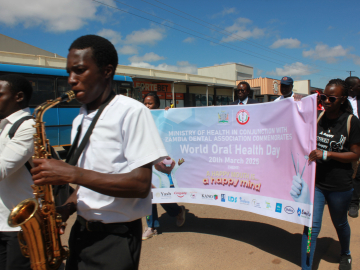Climate Change’s Threat to American Health
Former EPA administrator Gina McCarthy has an unambiguous message on climate change and its impact: “Climate change is really the greatest public health threat of our time.” During a Bloomberg American Health Summit discussion on Nov. 30 with her former EPA colleague, Tom Burke, McCarthy added, “Mostly, it’s about a threat to our children, and what kind of future we want to leave them.”
In a subsequent interview with GHN, she shared her thoughts on climate change’s immediate threats, the importance of better science communications and the impact of the Trump administration’s changes at the EPA.
McCarthy is a professor of the Practice of Public Health at the Harvard T.H. Chan School of Public Health and the director of the Center for Climate, Health, and the Global Environment.
What are the most immediate health effects of climate change in the US right now?
You can see them. It’s the fires in California. It’s the floods that we’re seeing. It’s the Atlantic ocean that’s being so active in terms of hurricanes and seeing the damage that they do. But there’s other things that people don’t see. Heat stress is a problem. We’ve lost thousands of people in Arizona and California just maybe 10 years ago. And we’re talking about basically the communicable diseases that we’re seeing here in the United States that never existed before, but because of the change in temperatures that allow fungus to grow that never was here before. So we’re talking about dengue fever in the US. We’re talking the potential for other diseases to expand like West Nile virus is expanding double-fold, they anticipate.
There’s all kinds of problems that you can see and problems that don’t get much of a look.
Has the public health community failed in communicating the connection between climate change and health?
I wouldn’t say they’ve failed but scientists often times are not the best communicators because they tend to speak in hypotheticals when the world wants certainty. Now I know that scientists are being careful in they way they project but nothing in this world is certain to a scientist so it’s important for them to speak about what they know. It’s important for all of us who are not frontline research scientists to try to figure out how I understand what they’re saying and make it relevant and understandable to normal human beings so they can begin to act on it. That’s what my job is at Harvard—is not to do the science but to translate the science.
I think that’s where we haven’t been as good as we could. We have tried to get attention to climate in a way that scared people instead embolding them with information on what the future could look like and how that benefits present day living. The biggest frustration for me is that if you look at what a low carbon future might be, it’s healthier, it’s cleaner, it’s more just. I like that future.
How much has the EPA changed in the last 2 years?
I think that some of the staff are discouraged. You know there’s been considerable effort to roll back regulations and rules that we’ve done, but I think that the uncertainty that it has provided to businesses and others has begun to become a flashpoint in the business community. I don’t think they they like it. But the good news is that most of those rollbacks are falling away in the courts and they are not going to be very successful because they are not following the science and the law and doing the public process that we did. I’m worried more about the time lag. I’m worried more about the fact that we need to get businesses, we need to get mayors, we need to get communities and grassroots to continue to march forward. If they do that, then the federal government will not lose time in terms of recouping and understanding the science. So while others may be worried, I am hopeful while at the same time a little bit ticked off. But I remain very hopeful that times will allow us and actions that are happening that Bloomberg and others support at the city level will pay off for us in the meantime.
Ed. Note: This Q&A has been edited for clarity and length.
Full GHN coverage of the Bloomberg American Health Summit is available here.




